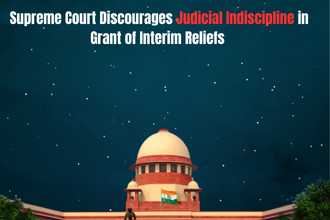On September 12, 2025, the Supreme Court of India delivered a significant judgment aimed at transforming the condition of Beggars’ Homes across the country. A Bench comprising Justice JB Pardiwala and Justice R Mahadevan issued a comprehensive set of directions to ensure that these institutions operate with dignity, accountability, and a focus on rehabilitation rather than social control.
This ruling arose from a tragic incident in 2000 at Lampur Beggars’ Home (Delhi), where contaminated water led to an outbreak of cholera and gastroenteritis, resulting in several deaths. The case highlighted gross lapses in sanitation, healthcare, and administration, prompting the Court to emphasize that neglect of such homes is not mere maladministration but a violation of the fundamental right to life with dignity under Article 21 of the Constitution.
Key Highlights of the Supreme Court Judgment
The Court stressed that Beggars’ Homes must shift from being punitive institutions to being rehabilitative spaces of social justice. The judgment sets out detailed guidelines under eight major categories:
I. Preventive Healthcare and Sanitation
- Mandatory Medical Screening: Every individual admitted to a Beggars’ Home must undergo a health check-up within 24 hours by a qualified medical officer.
- Monthly Health Check-ups: Regular medical assessments by designated teams.
- Disease Surveillance Systems: Early warning mechanisms to detect and contain outbreaks of communicable diseases.
- Minimum Hygiene Standards:
- Access to clean drinking water
- Functional toilets with proper drainage
- Regular pest control and vector management
These measures directly address the root causes of the Lampur tragedy and ensure no repetition of such lapses.
II. Infrastructure and Capacity
- Independent Infrastructure Audits every two years to assess conditions.
- No Overcrowding: Occupancy cannot exceed sanctioned capacity.
- Dignified Housing: Adequate ventilation, open spaces, and humane living conditions.
By mandating infrastructure audits, the Court ensures accountability and periodic oversight.
III. Nutrition and Food Safety
- Qualified Dieticians: Appointment of dieticians to supervise food quality.
- Standardised Dietary Protocols: Balanced nutrition to meet health needs.
Food is central to dignity, and the Court has ensured nutritional adequacy as a fundamental right.
IV. Vocational Training and Rehabilitation
- Skill Development Facilities to prepare inmates for employment.
- Public-Private Partnerships: Collaboration with NGOs, government agencies, and private institutions to expand training options.
- Periodic Assessment of rehabilitation outcomes and reintegration of inmates into society.
This reflects a rehabilitative, not punitive, approach, helping individuals move towards economic independence.
V. Legal Aid and Awareness
- Information on Legal Rights: Inmates must be informed in a language they understand.
- Panel Lawyers from State Legal Services Authorities: To visit Beggars’ Homes every three months and provide free legal aid.
This ensures that detention orders are contestable and that inmates have access to justice.
VI. Child and Gender Sensitivity
- Separate Facilities for Women and Children, with focus on safety, privacy, child care, education, and counselling.
- No Detention of Children: Children found begging must be referred to child welfare institutions under the Juvenile Justice Act, 2015, not kept in Beggars’ Homes.
This direction aligns with child rights and gender justice principles, ensuring special protection for vulnerable groups.
VII. Accountability and Oversight
- State-Level Monitoring Committees: Comprising Social Welfare officials, Public Health authorities, and civil society representatives. They must publish annual reports and maintain records of illnesses, deaths, and remedial actions.
- Compensation and Criminal Liability:
- States/UTs must pay reasonable compensation to families of inmates who die due to negligence or lack of facilities.
- Criminal proceedings may be initiated against responsible officials.
This accountability framework ensures that negligence is met with both financial and penal consequences.
VIII. Implementation and Compliance
- Centralised Digital Database: To track admission, health, training, release, and follow-up of all inmates.
- Timeline: Directions must be implemented within six months from the date of the judgment.
This ensures uniformity and continuous monitoring across the country.
Constitutional Significance
The Court observed that *failure to ensure humane conditions in Beggars’ Homes is a constitutional breach. The judgment strengthens the scope of Article 21 (Right to Life with Dignity) and reinforces the State’s responsibility under Article 38 to promote social justice and welfare of marginalized communities.
The ruling is a paradigm shift—from treating beggars as offenders to recognizing them as individuals entitled to rights, dignity, and opportunities for rehabilitation.
Broader Implications
- Human Rights Protection: The directions align India’s framework with international human rights standards, including the Universal Declaration of Human Rights and ICESCR.
- Administrative Accountability: States/UTs now have a legal duty to maintain health, sanitation, and welfare in Beggars’ Homes.
- Social Justice Lens: By mandating vocational training and rehabilitation, the judgment promotes reintegration rather than marginalization.
- Child Protection: The judgment reinforces the Juvenile Justice Act, 2015, ensuring children are treated as victims of circumstances, not offenders.
Conclusion
The Supreme Court’s judgment in M.S. Patter v. State of NCT of Delhi marks a landmark step in prison and institutional reform in India. By issuing a detailed framework for healthcare, sanitation, food, rehabilitation, legal aid, and accountability, the Court has shifted the focus from mere custody to care and dignity.
The implementation of these directions within six months will determine the real impact of this judgment. If properly enforced, it could transform Beggars’ Homes into institutions of rehabilitation, empowerment, and social justice, setting a precedent for humane treatment of marginalized populations across India.
Also Read
Supreme Court Upholds Coal India’s Dual Pricing Policy: 20% Hike for Non-Core Sectors Justified


